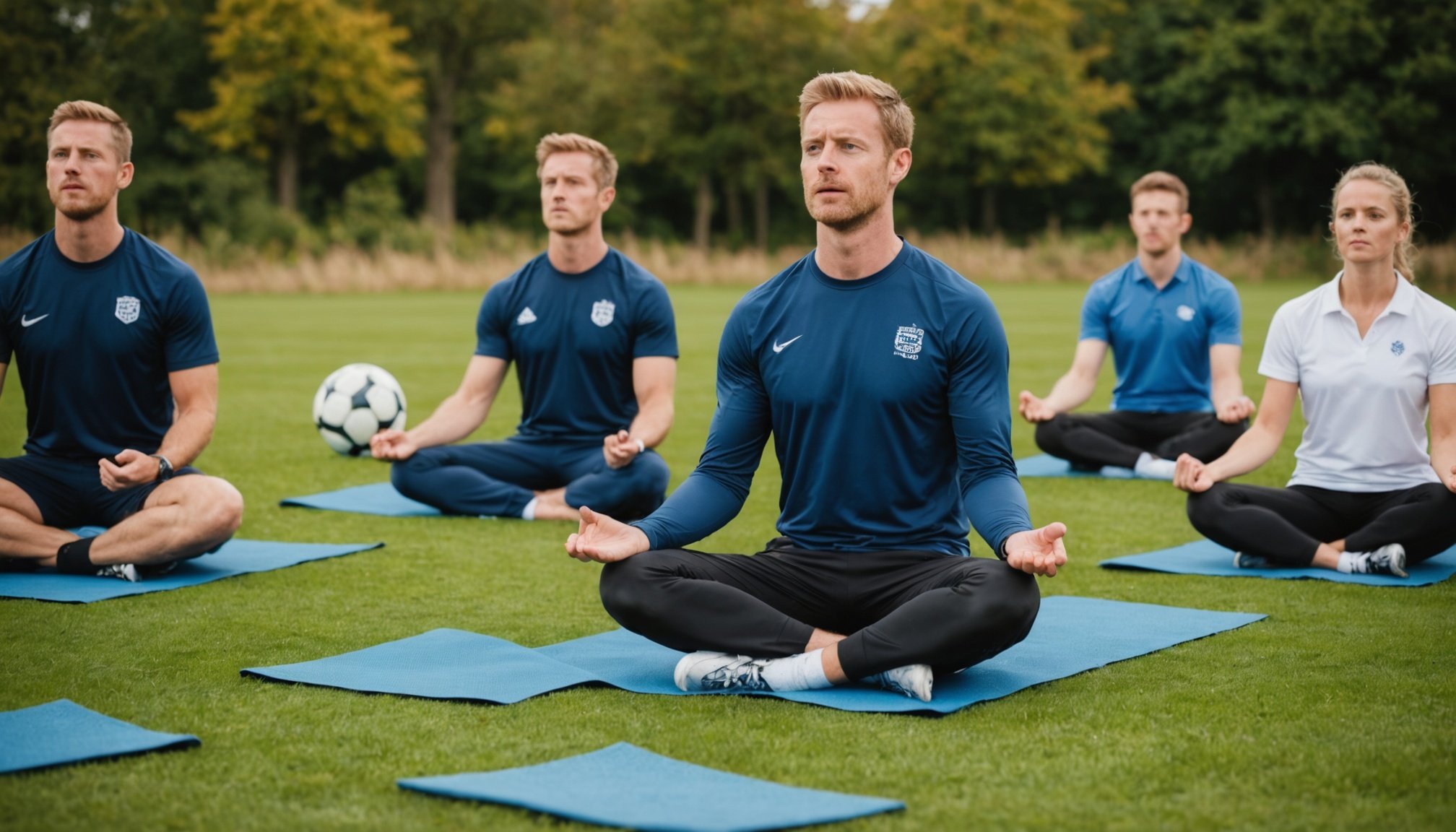Understanding Mindfulness in Sports
Mindfulness in sports involves being present in the moment with full awareness and focus. It’s about athletes paying attention to their thoughts and feelings without judging them, which allows for improved control over mental processes. This awareness aligns with the principles of mindfulness, which include concentration, acceptance, and letting go of distractions.
Mental resilience is crucial for athletes, as it empowers them to handle pressure, recover from failures, and adapt to challenging circumstances. Mindfulness plays a pivotal role in fostering this resilience. By practising consistent mindful exercises, athletes can enhance their psychological flexibility, making them less prone to stress and anxiety.
Topic to read : Maximizing goal-scoring performance: innovative tactics for handball teams in the uk
The psychological benefits of practising mindfulness are substantial. It aids in regulating emotions, reduces performance anxiety, and improves concentration, which collectively boosts athletic performance. When athletes incorporate mindfulness techniques into their training regime, they report better focus and a heightened ability to stay calm under pressure. This improved mental state can translate to more success during competitions.
In summary, the integration of mindfulness practices can significantly enhance mental resilience in sports. By cultivating greater attention, emotional regulation, and adaptability, athletes can elevate both their mental and physical performance levels.
Also read : Fostering respect and integrity in uk sports clubs: proven strategies for a thriving culture
Mindfulness Practices Adopted by UK Sports Teams
Mindfulness has made significant inroads into UK sports, where it serves to improve team dynamics and enhance athletic training routines.
Common Mindfulness Techniques Used
Several mindfulness techniques are prevalent among sports teams, aimed at boosting both individual and collective performance. Meditation practices are routinely adopted, fostering a heightened sense of awareness and concentration. Breathing exercises, often incorporated into warm-up routines, promote relaxation and focus, reducing stress before competition. Additionally, visualization is employed to mentally rehearse desired outcomes, helping athletes prepare for various scenarios they may encounter during events.
Implementation in Training Routines
These mindfulness techniques are seamlessly integrated into regular training sessions. Rather than being separate activities, they are woven into the fabric of daily practices. For example, teams might begin and end sessions with breathing exercises, while visualization exercises are often used in the lead-up to significant competitions. By embedding these practices into the routine, athletes can develop a consistent mindful awareness that aids both training and performance.
Role of Coaches in Mindfulness Practices
Crucial to the successful adoption of mindfulness is the role of coaches. Coaches not only support and encourage these practices but also ensure they are tailored to suit the team’s objectives. The guidance and example of coaches foster an environment where mindfulness becomes an integral part of athletic culture, enhancing both personal and team success.
Case Studies of Mindfulness Impact on Performance
Exploring the impact of mindfulness on UK sports teams unveils fascinating insights into performance improvement. Over recent years, several teams have incorporated mindfulness practices into their routines, yielding measurable changes.
One prominent example is a UK national football team that integrated mindfulness exercises into their training regimen. Coaches observed significant improvements in players’ focus and composure during high-pressure matches. Pre and post-implementation analyses highlighted enhanced decision-making skills and a marked reduction in stress levels among athletes.
A similar trend was noted within a professional rugby team. By adopting mindfulness meditation sessions twice a week, the team reported a 25% increase in overall performance. Players noted an improvement in their ability to remain calm and centred, even under intense, competitive conditions.
Testimonials from athletes involved in these case studies reflect a unified theme: mindfulness has substantially contributed to their mental wellbeing and athletic performance. A football player remarked on improved concentration, saying it “helped us maintain our heads in the game.”
These case studies underscore the potential for mindfulness to drive performance improvement, revolutionising the way sports teams approach both training and competition. The UK stands at the forefront, pioneering these innovative techniques.
Psychological Benefits of Mindfulness on Team Dynamics
Mindfulness has profound impacts on team cohesion and the overall mental health of team members. Establishing a mindful practice encourages individuals to become more aware of their thoughts and emotions, ultimately promoting a supportive and understanding environment.
Enhancing Team Cohesion
Mindfulness exercises strengthen connections between team members, crucial for achieving shared goals. By fostering empathy and active listening, mindfulness helps each member appreciate their colleagues’ perspectives, fostering a more unified group. As studies indicate, teams aware of each other’s feelings and thoughts are better equipped to collaborate effectively.
Improving Communication Among Team Members
Mindfulness enhances communication skills by encouraging presence and attentiveness during conversations. Developing a practice of mindfulness within the team can reduce misunderstandings and foster open dialogue. It encourages members to listen without immediate judgment, resulting in clearer and more honest exchanges.
Reducing Performance Anxiety
Performance anxiety can be a significant barrier to success, but mindfulness provides tools to manage it effectively. Techniques such as focused breathing and meditation address stressors linked to team dynamics. In turn, this reduces anxiety around performance, enabling team members to contribute without the fear of judgment.
Research Findings on Mindfulness and Athletic Performance
In the realm of sports psychology, various research studies have pointed to mindfulness as a potential enhancer of athletic performance. Numerous pieces of empirical evidence suggest beneficial outcomes resulting from mental training. Key research studies have explored how mindfulness can lead to enhanced focus, reduced anxiety, and improved resilience among athletes. For example, a study conducted by sports psychologists at a leading UK university found that incorporating mindfulness exercises in training regimes led to a noticeable improvement in performance metrics.
Experts consistently highlight the effectiveness of mindfulness strategies in promoting mental clarity and concentration, pivotal elements in any sport. By practising mindfulness, athletes can develop better control over their thoughts and emotions, leading to more consistent performances. The implications of these findings are significant for UK sports teams aiming to achieve success on both national and international levels. As mindfulness becomes an integral part of sports training programs, future research will likely focus on identifying the specific techniques that yield the most significant performance improvements.
The potential for further developments in this field holds promise for uncovering new strategies to integrate mindfulness practices effectively, paving the way for advancements in sports psychology.
Conclusion: The Future of Mindfulness in UK Sports
Implementing mindfulness in sports offers substantial benefits for athletes’ performance and well-being. As sports innovation continues to evolve, integrating sustainable practices like mindfulness can foster long-term success. Mindfulness enhances focus, reduces stress, and improves mental resilience, leading to an uplift in athletes’ performance across disciplines.
Integrating Mindfulness for Long-Term Success
Long-term integration of mindfulness in sports ensures athletes not only excel in their performance but also maintain their mental health. Continuous practice ingrains these benefits into everyday routines, creating more sustainable physical and mental health improvements.
Potential for Wider Adoption Across Sports
There is a significant opportunity for mindfulness to become standard practice across various sports teams. As awareness grows about the advantages of mindfulness, more teams are likely to incorporate it into training regimes. This trend aligns with future trends aiming for holistic athlete development.
Challenges and Considerations
Despite the benefits, there are challenges to widespread adoption. Limited awareness and misconceptions about mindfulness may act as barriers. Education and showcasing real-world examples of improved athlete performance can help overcome these challenges.
- Continuously advocate for mindfulness practices
- Provide training for coaches and athletes
- Incrementally integrate mindfulness sessions into regular training











